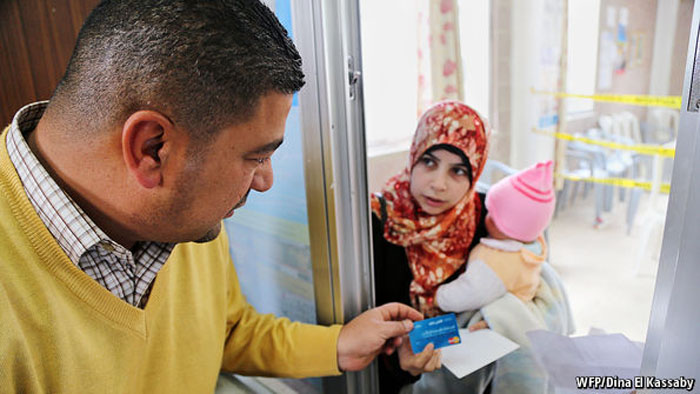BACK in Syria food was cheap, remembers Maya, as she sits cross-legged in the small flat she shares with her husband, their five children and another couple in Amman, Jordan’s capital. When she first arrived here, she had to cut back. But now, with her husband working and 20 dinars ($28) a month from the World Food Programme (WFP), a UN agency, she can buy the children a treat like fish or chicken.
Scattered across Turkey, Lebanon and Jordan are 4.4m registered Syrian refugees, 90% of whom, like Maya, live outside formal refugee camps. This makes it a logistical nightmare to get the traditional food aid to them—sacks of rice and pulses. The WFP, the world’s largest food-aid provider, has adapted: a decade ago, it doled out aid only in kind. Now just over a quarter of its aid globally is cash-based. Every month Maya gets a text message alerting her that her special debit card, which she can use only to buy food, has been topped up. The WFP reaches around 1.1m refugees like this in Jordan, Lebanon and Turkey.
This week saw the launch in neighbouring Turkey of the largest-ever humanitarian-aid project financed by the EU: a whopping €348m ($390m) for the WFP, in partnership with the Turkish Red Crescent, to be transferred to electronic cards held by up to 1m refugees. Unlike Maya’s, their cards will be unrestricted; they can withdraw cash from ATMs. In effect, the WFP is shifting from aid in kind to electronic distribution—first of food and now of cash—giving refugees more choice over what to buy.
The vast majority of the WFP’s aid is still food in kind or in e-cards limited to food. Donors want to know that their money is being well spent (“food” is in WFP’s name, after all). In Mafraq, a city in Jordan where Syrians number 50% of the population, Nour Sahawneh directs volunteers handing out old-fashioned bags of rice and tea. He admits that some refugees sell them, perhaps to pay the rent. But at least he knows they are not overcharged.
Delivering food as aid, even indirectly, by vouchers or e-cards, inevitably distorts markets. A shop sure of aid-financed customers may be tempted to raise prices. But money-based help at least takes procurement decisions away from well-meaning but misguided aid workers and pumps money directly into the local community. Also, studies have shown that recipients of cash-based aid consume a more varied diet (though, in fact, fewer calories).
Your flexible friend
The WFP has learnt that some forms of cash-based aid are better than others, however. The food vouchers it once used turned out to be a good way of transforming photocopiers into aid-printing machines. They also irritated users, who had to queue for the vouchers and spend them all at once. Maya prefers her e-card, though she still has to queue at the supermarket. Sometimes fights break out in the rush to the shops when the cards are topped up.
The queues might be shorter if Maya could use her card at any shop. At first she had to spend 10 dinars just on the taxi to her closest WFP-approved supermarket. Saleh Dhnie, a 59-year-old Syrian refugee and a former civil servant, gets 20 dinars a month from the WFP in Jordan, but is convinced the chosen supermarkets raise their prices when cards are topped up. The street market, he grumbles, is much cheaper.
Contracted shops certainly seem to be doing a brisk trade. In Lebanon the e-card programme doubled revenues at those taking part. Rami Al Shdeafat, who manages a supermarket in Amman, says he bought four extra card-readers to cope with the surge in custom. He insists his prices are competitive, boasting of the promotions on offer and pointing proudly to a bag of milk formula that normally sells for 11 dinars and that is on sale for 9.52 dinars. Besides, the Syrian customers are much more price-sensitive than Jordanians.
The WFP doesn’t take his word for it: every 20 days it sends price-checkers. Some shopkeepers are deterred by this. Amer Shbeilaat runs a smaller food shop with, he claims, the lowest prices in Mafraq but doesn’t accept the WFP’s card. He heard some shops lost their contracts for raising prices. He can do without the bother. Letting competition drive down prices is more effective than intrusive checkers. In Lebanon, after WFP officials spotted that prices were lower in shops facing more competition, they enlisted more shops to accept their cards—up from 250 in 2014 to around 460 today. This has helped keep prices low.
For now, in Lebanon and Jordan, unlike in Turkey, WFP officials are sticking to cash-based but restricted schemes—and hence to the agency’s mandate, as a single-purpose food-aid provider. Officials worry that to move to unrestricted schemes, as in Turkey, might in effect hand the cash to landlords in the form of higher rents. They also worry about funding. “You can’t get people used to cash one day and then go back the other day,” says Dominik Heinrich, head of the Lebanese branch of the WFP. And free-floating cash is harder to monitor. The WFP in Lebanon is busy analysing masses of transaction-level data from contracted shops. They hope these will serve to reassure donors that their funds are being well-spent, and could even be used to work out how much aid they should be giving.
But aid-workers must have realised that, rather than spend hours checking up on grasping shopkeepers, it would be easier simply to hand out cash. It also would give refugees more freedom. An experiment with unrestricted cash handouts in Lebanon suggests that people do indeed like the chance to spend the money as they please. As a spokesman for the European Commission said, in justifying the EU’s intervention in Turkey: “Cash empowers the beneficiaries…They are the best placed to know what their basic needs are.” And few could begrudge them that little scrap of control over their tempest-tossed lives.







Comments